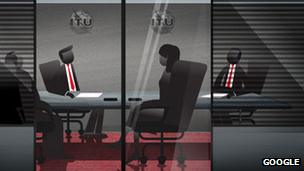Google attacks UN's internet treaty conference
- Published
- comments

Google has warned that a forthcoming UN-organised conference threatens the "free and open internet".
Government representatives are set to agree a new information and communications treaty in December.
It has been claimed some countries will try to wrest oversight of the net's technical specifications and domain name system from US bodies to an international organisation.
However, the UN has said there would be consensus before any change was agreed.
Google has asked web users to add their name to an online petition to support its view.
"The [UN agency] International Telecommunication Union (ITU) is bringing together regulators from around the world to renegotiate a decades-old communications treaty," it wrote on its Take Action site.
"Some proposals could permit governments to censor legitimate speech - or even allow them to cut off internet access.
"Other proposals would require services like YouTube, Facebook, and Skype to pay new tolls in order to reach people across borders. This could limit access to information - particularly in emerging markets."
Google added that it was concerned that "only governments have a voice at the ITU" and not companies or others who had a stake in the net, concluding that the World Conference on International Telecommunications (Wcit) was "the wrong place" to make decisions about the internet's future.
However, the ITU has said that each country could invite whoever it likes to be part of its delegation at the meeting.
Leaked documents
The ITU has said a new treaty was needed to ensure "the free flow of information around the world, promoting affordable and equitable access for all and laying the foundation for ongoing innovation and market growth".
It added that the growth of the internet and adoption of mobile phones meant the existing agreement - signed in 1998 - needed to be updated.
The agency is not openly publishing each government's proposals ahead of the conference, however a site called Wcitleaks, run by researchers at George Mason University, has revealed some of the details.
Most recently these included a proposal from Russia suggesting that the US should have less control over the internet's operation.
"Member states shall have equal rights to manage the internet, including in regard to the allotment, assignment and reclamation of internet numbering, naming, addressing and identification resources and to support for the operation and development of basic internet infrastructure," it said in a document submitted on 17 November.
This would mark a shift from the current set-up in which such matters are looked after by non-profit bodies which are officially under the remit of the US Department of Commerce, but in effect operate at arm's length from the US government.
The Russia Today news service had previously reported that China and India backed the Kremlin's view that the ITU could take over these functions.
However, the US's ambassador to the conference, Terry Kramer, has already signalled he would not support this saying the existing institutions had "functioned effectively and will continue to ensure the health and growth of the internet".
Tolled traffic
Parts of the US tech industry have also been concerned by remarks by the ITU's secretary general, Dr Hamadoun Toure, that the meeting should "address the current disconnect between sources of revenue and sources of costs, and to decide upon the most appropriate way to do so".
Dr Toure said that the new treaty should be designed to help encourage broadband rollout and investment, later adding that telecom companies had the "right to a return on [the] investment" needed to avoid congestion.
But Google is not alone in fearing some countries will suggest the best way to do this will be to introduce "tolls" in which popular sites have to pay developing nations money if they send a lot of traffic through their data networks.
"Many countries are used to getting revenue from telephone calls, and those telephone calls have gone away in favour of various internet-based video services which don't produce revenue for them," Gary Shapiro, president of the US's Consumer Electronics Association, told the BBC.
"So they are looking to recover it and they are trying to put a charge on incoming internet access. So if you have a website which is very popular worldwide you would have to pay to get access to them - we think that is wrong.
"We think the value of the internet is that it is available to everyone for free without international barriers."
Unanimous decisions
The ITU is hosting the conference to draw up the treaty between 3 to 14 December in Dubai.
Dr Toure has signalled that if there were any serious disagreements he would try to avoid putting an issue to a majority vote.
"We never vote because voting means winners and losers and you can't afford that," he told the BBC in July.
"Whatever one single country does not accept will not pass."
But experts warn this poses a risk that participants leave some issues unresolved.
"In the worst case there's a danger you could see a splintering of the internet," said Prof Alan Woodward, from the department of computing, University of Surrey.
"Some countries including Russia already restrict which sites can be accessed, but if people start going off and doing their own things in term of naming conventions and net addresses you could end up with different parts of the internet being unable to send traffic to each other.
"It would be the online equivalent of not being able to make a telephone call from one nation to another."
- Published1 November 2012
- Published3 August 2012
- Published15 June 2012
- Published7 June 2012